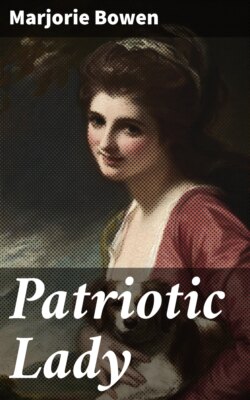Читать книгу Patriotic Lady - Bowen Marjorie - Страница 8
На сайте Литреса книга снята с продажи.
* * * * *
ОглавлениеTable of Contents
The poor cottage, the long, narrow, village street, with the squalid inn, the forge, the tiny post office, the wide moors beyond, the scattered farms, the straggling flocks of fat-tailed, silly-faced sheep, all blurred and sodden in the wet grey winter weather, depressed Amy's spirits to a melancholy most unusual to her cheerful temperament; she felt as desperate as if she had been thrown into a lazar-house or Cold Bath Fields Prison. She wept for all she had so suddenly left, the warmth, the food, the drink, the games and caresses, the lazy ease of hours spent before a mirror, lolling on a sofa or flinging cards on the table where the rouleaux of guineas were piled.
Dame Kidd had no consolation to offer; she knew that Amy's plight was a common case. In the better farms hung series of cheap prints that told a story with a moral. One of these might have been Amy's story—at least in the first stages. There was a harsh title to these pictures, the first of which showed the fresh, smiling country-girl descending from the coach that had arrived in London from the provinces, looking about her on the bustle of London, all agog for fun and soft living and a fine young man to praise her and pay her bills. Even so had Amy at sixteen years of age tripped for the first time through the dubious London streets, nosing after pleasure.
Very quickly, both in Amy's case, and in that of the pictured belle, was the rich protector found—such fresh charms are easily marketed. There, in the print, she might be seen behaving as Amy had behaved at Up Park, fashionably dressed, pampered, petulant, kicking over the tea-table in a tantrum under her lover's nose.
If Amy were not very careful, she might fulfil the destiny so graphically depicted in the first episodes of this savage warning to jolly country-girls eager for town delights, she too might come to beat hemp in Bridewell, to lie in a pauper's coffin with "anno vicesimo tertio aetatis suae" on the cheap lid.
The way of virtue was not only closed to her but exceedingly distasteful; she knew what it was to be a nursemaid in a Welsh farm, in the house of a fashionable London doctor, in decent establishments, where mistresses were careful of their maids' reputation; it would be quite impossible for her to return to so odious an existence—a scrubbing-brush would be no more incongruous in the hands of a nymph of Paphos than a serving-wench's cap on the well-set head of Amy Lyon.
Nor did it seem as if she would be welcomed back to the path of discretion and peace; Dame Kidd's neighbours looked askance at the returned prodigal; the girls who in homespun shawls had once herded sheep with her on the moors, sneered at the town finery that had so soon become soiled, that looked so foolish in the wattled cottage; married women who kept their own daughters respectable, wanted to know who was the teasing baby who ran after Dame Kidd and who was sometimes kissed and sometimes slapped by the despondent Amy.
Only one thing seemed possible in such a plight, an appeal to the late protector, who might surely be won round from his ill-humour by cajolery, by entreaties, as he had been won before.
Amy had learned, when in London, to read a little, to spell a little, and she sat down in despair and wrote to Sir Harry Featherstonehaugh seven letters, one after another; the gossips lounging at the village post office grinned when they read the superscription and sniggered as the days went by without a reply. In the seven unanswered letters was all her story.
